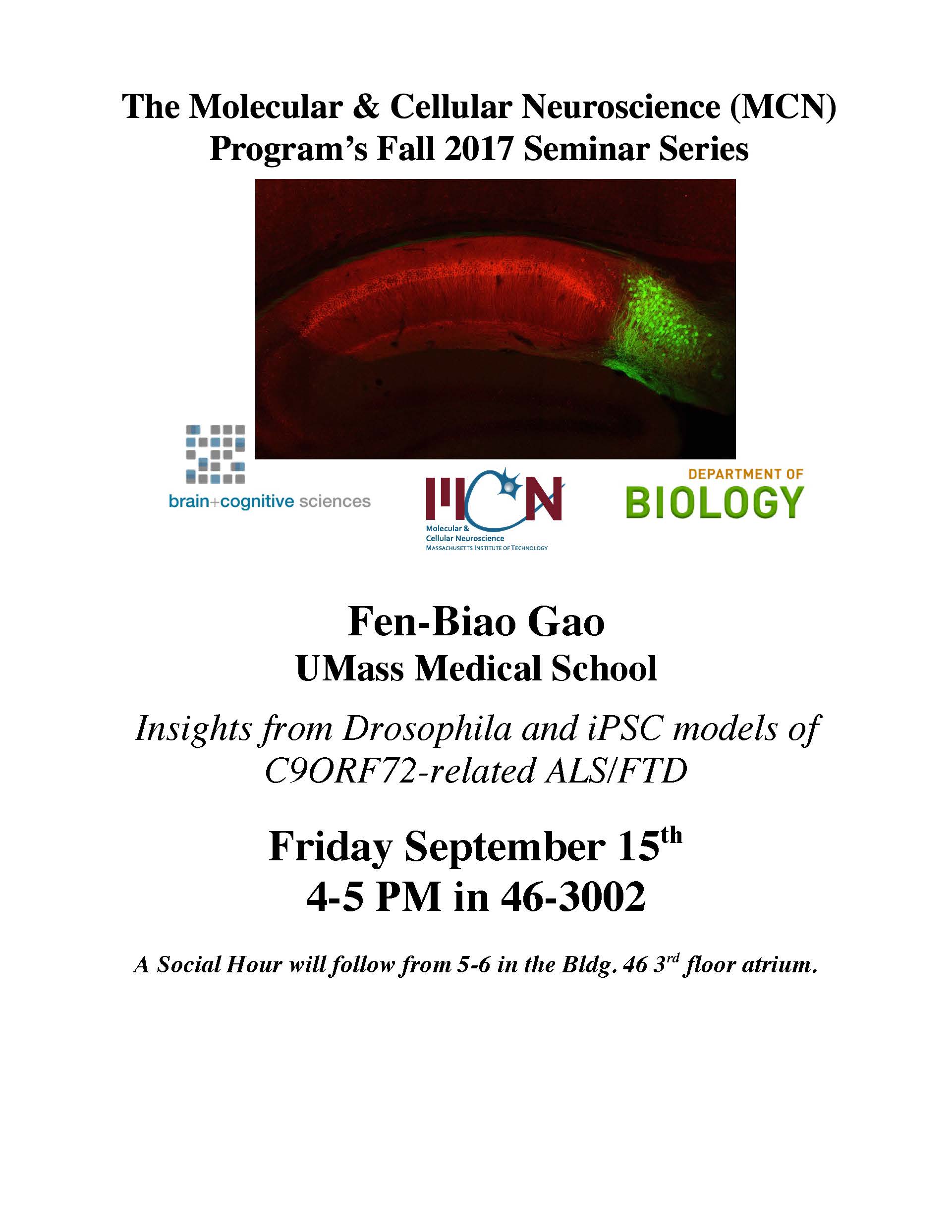
The Molecular & Cellular Neuroscience Program's Fall 2017 Seminar Series
Description
Talk title: "Insights from Drosophila and iPSC Models of C90RF72-related ALS/FTD"
Speaker Bio
Fen-Biao Gao PhD
Title: Professor, Institution University of Massachusetts Medical School, Department Neurology, University of Massachusetts Medical School
Other Positions:
InstitutionUMMS - School of MedicineDepartmentNeurology
InstitutionUMMS - School of MedicineDepartmentNeuroNexus Neuroscience Institute
InstitutionUMMS - School of MedicineDepartmentRNA Therapeutics Institute
InstitutionUMMS - Graduate School of Biomedical SciencesDepartmentCell Biology
InstitutionUMMS - Graduate School of Biomedical SciencesDepartmentInterdisciplinary Graduate Program
InstitutionUMMS - Graduate School of Biomedical SciencesDepartmentMD/PhD Program
InstitutionUMMS - Graduate School of Biomedical SciencesDepartmentNeuroscience
InstitutionUMMS - Graduate School of Biomedical SciencesDepartmentTranslational Science
Biography
education and training
Peking University, Beijing, , ChinaBS
BiochemistryTsinghua University, Beijing, , ChinaMS
BiochemistryDuke University, Durham, NC, United StatesPHD
Molecular Biology
Positions:
- 09.1990–09.1995 PhD Student, Duke University Medical Center
- 10.1995–09.1997 Postdoctoral Fellow, University College London
- 10.1997–06.2000 Postdoctoral Fellow, University of California, San Francisco (UCSF)
- 07.2000–05.2006 Assistant Investigator/Assistant Professor, Gladstone/UCSF
- 06.2006–01.2010 Associate Investigator/Associate Professor, Gladstone/UCSF
- 02.2010–present Professor, Department of Neurology, UMMS
Honors and Awards:
- 1995 Departmental Norman Conant Award, Duke University
- 1995–1998 Hitchings-Elion Fellowship, Burroughs Wellcome Fund
- 1998–2000 Senior Postdoctoral Fellowship, American Cancer Society California Chapter
- 2001 Sloan Research Fellow in Neuroscience, Alfred P. Sloan Foundation
- 2002 Klingenstein Fellow in Neuroscience, Esther A. and Joseph Klingenstein Fund
- 2002 McKnight Neuroscience of Brain Disorders Award, McKnight Foundation
Research Focus: Understanding Frontotemporal Dementia and Neuronal microRNAs
Frontotemporal dementia (FTD) is an age-dependent neurodegenerative condition associated with focal atrophy of the frontal and/or temporal lobes and recognized now as the most common form of dementia before the age of 60. Unfortunately, the molecular pathogenesis of FTD remains largely unknown and effective treatments are not available. Recent exciting advances indicate that FTD is often associated with amyotrophic lateral sclerosis (ALS) and several genes are involved in thepathogenesis of both FTD and ALS, including CHMP2B, TDP-43, FUS, and C9ORF72. How these mutant proteins cause or contribute to neuronal dysfunction and neurodegenerationin FTD remains poorly defined.
A few years ago, we cloned anovel Drosophila gene called shrub, which encodes a key component of ESCRT-III and regulates dendritic morphogenesis. In cultured cortical neurons, we found that dysfunctional ESCRT-III, lacking essential components (such as mSnf7-2, one of the mouse homologs of Shrub) or containing ectopically expressed FTD3-associated mutant CHMP2B, causes dendritic retraction,autophagosome accumulation and eventual neurodegeneration. Through an unbiased genetic screen in a Drosophila modelof FTD3, we identified several genetic modifiers of CHMP2B toxicity in vivo that are currently being characterized. We have also been using Drosophila models to study other FTD genes.
We have also established patient-specific induced pluripotent stem cells (iPSC) models of FTD with mutations in progranulin, C9ORF72 and other genes. Over the next a few years, we will use a combination of molecular, cellular, and genetic approaches in both Drosophila and iPSCs models to further dissect the pathogenic mechanisms involving these FTD disease genes. Our ultimate goal is to identify common underlying pathogenic pathways as potential targets for therapeutic interventions.
Another research interest in our laboratory is the microRNA pathway. The roles of this pathway in FTD-associated neurodegeneration will be investigated in detail.
Additional Info
Fen-Biao Gao Lab https://www.umassmed.edu/fenbiaogaolab/

